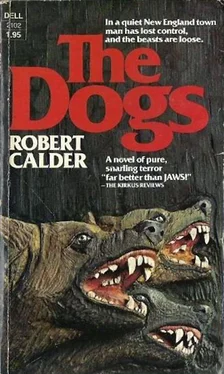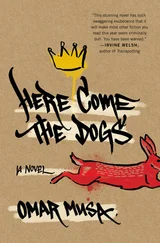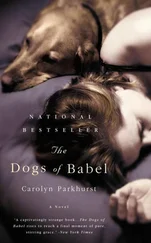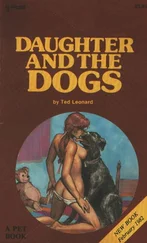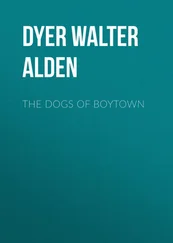Robert Calder - The Dogs
Здесь есть возможность читать онлайн «Robert Calder - The Dogs» весь текст электронной книги совершенно бесплатно (целиком полную версию без сокращений). В некоторых случаях можно слушать аудио, скачать через торрент в формате fb2 и присутствует краткое содержание. Жанр: Ужасы и Мистика, Триллер, на английском языке. Описание произведения, (предисловие) а так же отзывы посетителей доступны на портале библиотеки ЛибКат.
- Название:The Dogs
- Автор:
- Жанр:
- Год:неизвестен
- ISBN:нет данных
- Рейтинг книги:4 / 5. Голосов: 1
-
Избранное:Добавить в избранное
- Отзывы:
-
Ваша оценка:
- 80
- 1
- 2
- 3
- 4
- 5
The Dogs: краткое содержание, описание и аннотация
Предлагаем к чтению аннотацию, описание, краткое содержание или предисловие (зависит от того, что написал сам автор книги «The Dogs»). Если вы не нашли необходимую информацию о книге — напишите в комментариях, мы постараемся отыскать её.
Then one day the dog revert to his primal nature…
The Dogs — читать онлайн бесплатно полную книгу (весь текст) целиком
Ниже представлен текст книги, разбитый по страницам. Система сохранения места последней прочитанной страницы, позволяет с удобством читать онлайн бесплатно книгу «The Dogs», без необходимости каждый раз заново искать на чём Вы остановились. Поставьте закладку, и сможете в любой момент перейти на страницу, на которой закончили чтение.
Интервал:
Закладка:
The second hand hit the 12, a red light winked on, the engineer in the control room jabbed a finger at him.
Harry looked down at the first type sheet The lead WCVS, Your Voice in the Valley, presents an Editorial on the Air by Station Manager and President Harry Wilson! with a little fanfare-would be spliced in before broadcast.
"Last night at the intersection of Prince and Fair streets, an elderly woman was viciously attacked and savagely bitten by a large stray dog,"
Harry said. "This is the sixth such incident in Covington this year.
We have addressed ourselves before to the dog problem. Now we believe it is time to take the gloves off and go at it with bare knuckles.
Something must be done. I'm going to give you some hard facts, and like 'em or not, they are the facts.
"Item: There are 6000 dogs in this city alone. Each day they release 4800 quarts of urine and drop 3000 pounds of excrement into our living space.
"Item: This waste material can lead not only to garden varieties of infection, but also to a host of serious diseases like toxacara cams, visceral larval migrans and leptospirosis, which can cause blindness, gross neural damage, meningitis and brain impairment. These diseases are frequently misdiagnosed, and some authorities believe they are moving to epidemic stage in this country.
"Item: Two hundred seventy-four Covingtonians were bitten seriously enough last year to seek medical attention.
"Item: The Covington SPCA had to put to sleep nearly 2000 ownerless or unwanted dogs last year. Across the nation, the number topped fifteen million, at a cost of $60 million.
"Item: There is a dog population explosion in the United States, and the animals are increasing their number by 36 percent every twelve months.
"Item: According to the Pet Food Institute, dogs devoured six billion pounds of dog food last year, their owners shelling out a hefty $1 billion.
This in a time of economic recession, and this forcing non-pet owners into economic competition with dogs for red-meat products.
"Item: Across our nation, there are hundreds of thousands of dogs gone wild, and perhaps as many as 10,000 in this state alone. In Georgia last year wild dogs killed an estimated 5000 head of cattle. In our own state, they tore apart more than 12,000 deer and countless numbers of sheep, goats, chickens, small game, and nesting birds. Several leading naturalists have called dogs the largest predatory menace this country has ever faced, and wild dogs are vastly more ferocious and dangerous than wolves ever were.
"Dog owners refuse to accept their responsibilities, and authorities apparently do not intend to fulfill their legal obligations. All right. If that's the way they want it, then that's the way we'll give it to 'em. We feel we have no choice but to put the following proposals, Draconian though they may be, before the city council and demand their enactment. First, raise dog licenses to $50. Second, fine dog owners $100 for failure to keep their dog leashed, chained, or secured behind a fence the first time, $250 for the second offense, and next time confiscate the animal. Third, confiscate and euthanize any dog who bites a human being unless it can be proved that the victim directly provoked the bite. Fourth, specially license all female dogs owned for breeding purposes, and mandate spaying of all females not so licensed by the age of twelve months. Fifth, conservation officers and other law-enforcement personnel will be required to shoot any dog found roaming in forest or meadowland, and any private citizen will be legally entitled to do likewise.
"There you have it. We are no longer worried about a problem, we are struggling with a crisis. And I assure you that no matter how harsh the measures we must take, we will take them. We are not-and this is no pun-going to let this city, this state, or this nation go to the dogs.
"This is Harry Wilson, concluding a WCVS "Editorial on the Air."
The red light went out. The engineer raised his thumb.
His voice came through the speaker over the control room panel. "That was nice, Mr. Wilson. You want a playback?"
"Yes."
Wilson listened. He was pleased with his delivery. He ordered an extra girl on the switchboard through the day tomorrow, when the tape would be broadcast every hour on the hour, to handle the calls.
Homer McPhee dumped the baled hay in the pasture and pushed the wheelbarrow back up the slope to the cinderblock barn. They didn't use the barn anymore, let the cattle winter over in the pasture. It was Homer's idea.
His father had said they'd lose half a dozen to winter-kill. Homer said if they did, he'd meet the cost out of his own pocket. John McPhee had agreed on that basis. They'd been running a small herd of black Angus for six years, a bull and eighteen cows, and had lost one or two and sometimes three to respiratory infections each winter. Homer had argued that the humidity was too high in the barn, the cows would be healthier in the elements. He'd been right, and his father was happy to admit it.
John McPhee had been raised an urban boy, but had loved the country from the day his father had bought a summer house and the family began to vacation there. After graduation from the State Teachers' College he took a job in Covington and married. When his father died, his finance-baffled mother turned the insurance money over to him and he bought a large tract that had been decent farmland a couple of generations back-mostly first growth timber now, with good contours, streams and two spring-fed ponds-and he built a house big enough for him, his wife, his mother and a couple of children. McPhee taught mathematics in Covington, and was good at it, but he loved the land more than anything else. Weekends and summers he built, cleared, excavated, reclaimed, and fenced. He grew vegetables, raised poultry, sheep, and later cattle. He felt in harmony with the land and knew, with pride, that if civilization went to hell, he and his family could make do just fine.
His oldest son, Homer, was a great satisfaction to him. Homer was big, strong, and able, and saw the land as a medieval baron must his fiefdom; it was Homer's birthright and heritage; it was as much a part of him as his heart. John would have been happier if Homer had gone to agricultural college, but Homer was impatient, and he was taking correspondence courses from the college, which in the end would probably be good enough. John marked a hundred acres for the boy and told him he'd deed it over as soon as Homer had a house standing and some acres ready to cultivate and graze.
John was forty-five and hardy; his old age was only a flicker in the dim future, but it pleased him to think he would spend it with a son like Homer, who, like his tough forebears, could provide through his own skills everything he and his required.
Homer put the wheelbarrow away and went into the house, to his room, and got the syringe and bottle of hormone he kept hidden there. In the pasture, he pierced the stopper and drew the liquid into the cartridge, injected the hormones into a calf, which, eating, did nothing more than grunt and step to the side. He reloaded the syringe and went to the next calf. His father would have been furious. Homer loved him, but John McPhee was a man who lived in the past. He wouldn't use chemical fertilizers, and thus harvested only a small portion of what he could have otherwise. He wouldn't modernize his chicken coop-"It's not natural for a creature to live in a wire cage from birth to death and never even touch the ground" or automate the feeding. He refused to force the growth of his cattle. Homer had clandestinely injected all of last year's calves, and they averaged 200 to 300 pounds more at sale time, profits up substantially, which was all the reason Homer needed.
John marveled and praised the soundness of his stock. Homer smiled and kept his silence. There were many things his father wouldn't do, almost as many as Homer would.
Читать дальшеИнтервал:
Закладка:
Похожие книги на «The Dogs»
Представляем Вашему вниманию похожие книги на «The Dogs» списком для выбора. Мы отобрали схожую по названию и смыслу литературу в надежде предоставить читателям больше вариантов отыскать новые, интересные, ещё непрочитанные произведения.
Обсуждение, отзывы о книге «The Dogs» и просто собственные мнения читателей. Оставьте ваши комментарии, напишите, что Вы думаете о произведении, его смысле или главных героях. Укажите что конкретно понравилось, а что нет, и почему Вы так считаете.
